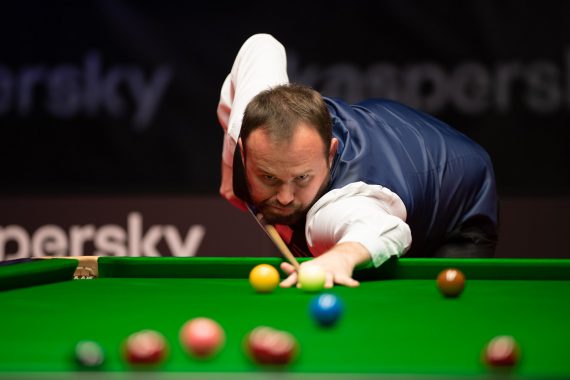Tour Survival 2019: Five to Go
With just five events still to be completed during the 2018/19 season today we take a look at the state of play in this season’s battle for tour survival, with several big names needing wins to be sure of retaining their places on the World Snooker Tour.
- View the latest provisional end of season rankings
- View the indicative prize money schedule for 2018/19
- View our guide to the current ranking system
What is the provisional end of season ranking list?
The provisional end of season ranking list includes all money earned during last season (2017/18), and from the current 2018/19 season.
This differs from the official rolling world ranking list, which still currently includes prize money from the 2016/17 season. As this is set to be deducted throughout the course of this season however, to provide the most accurate picture of the tour survival battle, this money has already been removed from the table as it will not count towards the race for next season’s tour places.
How will tour places be decided?
At the end of this season (i.e. after the 2019 World Championship), all players not on the first year of a two-year tour card must either finish inside the world’s top 64 on the official two-year ranking list, or as one of the top eight money earners during the 2018/19 season to be guaranteed a tour place from the start of next season.
Who is already safe?
Those who do not have to worry (for this season at least), are those players who were able to earn a two-year tour card for the 2018/19 and 2019/20 seasons, either via the Q School, international competitions or by other means.
All of these players have been highlighted in green on the latest provisional end of season ranking list.
Who is at risk?
In short – everyone else.
All players who retained their main tour places for this season by finishing in the top 64 at the end of last season, or who began their two-year tour cards at the start of 2017/18, must earn their place for the 2019/20 season.
Of course those higher up the rankings will have nothing to worry about, but the closer they are to the all-important ‘top 64’ cut-off, the more nervous they will be.
How can players stay on tour?
There are two ways for current tour players to be able to retain their places on tour for the 2019/20 season without the need to re-qualify via Q School:
By finishing in the top 64 of the world rankings at the end of the 2018/19 season.
Traditionally the cut-off point for tour survival, the top 64 on the official world ranking list following the 2019 World Championship will retain their places on tour for at least another season.
What is the cut-off point likely to be in terms of prize money? Not long ago around £50,000 would have been enough to finish inside of the top 64, but in recent years this figure has increased significantly to £60,050 (2017) and most recently £86,900 earned by veteran Scot Alan McManus during the two years up to the end of last season.
Already current 64th placed player Zhao Xintong has £80,500 to his name with five events to be completed, meaning that it is likely that as much as £90,000 – £100,000 could be required for safety this time around.
The top 64 players next May will each earn a fresh one-year card for the 2019/20 season.
By finishing in the top eight of the one-year list, not already qualified for the main tour
Under the ‘one-year list’ route, the top eight players taking into account prize money earned solely during the 2018/19 season, who finish outside of the top 64 on the main two-year ranking list, will earn a new tour card.
This means that players out of the running on the two-year list, for example due to a poor first season (in this case 2017/18), still have every chance of earning a fresh two-year card with strong performances during their second year.
At the time of writing, those currently in place to earn tour places via this route are:
- Eden Sharav (£48,600)
- Ian Burns (£34,600)
- Fergal O’Brien (£32,600)
- Alexander Ursenbacher (£29,600)
- Duane Jones (£28,500)
- Dominic Dale (£26,600)
- Joe Swail (£24,600)
- James Cahill (A) / Rory McLeod (£24,000) (tied players will be ranked on countback, best most recent event)
Chasing pack: David Lilley £22,500, Nigel Bond £21,500, Peter Lines £21,500, Gerard Greene £21,100, Rod Lawler £20,500, Paul Davison £20,000, Ross Muir £18,100, Zhang Yong £16,000, Xu Si £15,500, Jimmy White £14,500
The eight players who finish in these positions at the end of this season will earn a two-year card for the 2019/20 and 2020/21 seasons.
Note that amateur players competing in events as top up players are eligible to qualify via this route.
What are the main points of interest?
As is the case every season, a quick glance at the provisional end of season ranking list inevitably invites a few raised eyebrows as the order can be very different to the current official ranking list. This is because different players have earned their total prize money at different times over the current two-year period and those who had a weaker 2017/18 season relative to the year before will likely find themselves facing a drop down the list.
An example of this is former German Masters champion Anthony Hamilton, who has been among those outside of the top 64 on the provisional end of season list, despite having begun the season ranked inside of the top 30. This is because of a poor 2017/18 season, combined with the removal of prize money earned following his fantastic 2016/17 campaign during which he claimed his maiden ranking title.
However, following his recent run to the semi-finals of the Indian Open which earned him £15,000, Hamilton has now vaulted to 62nd in the provisional list to give himself a real chance of finishing the season inside of the world’s top 64. Should he fall out, with £58,500 earned during this season alone has done more than enough to survive via the one-year list, albeit this would see his ranking total reset to zero.
Others currently in the lower reaches of the top 64 include the likes of former Masters champion Alan McManus and 1997 world champion Ken Doherty, each likely needing one win in Sheffield to make absolutely sure of their places, while Mike Dunn, Robbie Williams, Daniel Wells and Liam Highfield will be looking to do the same.
Experienced players who find themselves just the wrong side of the top 64 heading towards the closing stages of the season include Fergal O’Brien (65), Dominic Dale (66) and Rory McLeod (67). Best placed is O’Brien, who stands just £2,800 behind 64th placed Zhao Xintong and £32,600 on the one-year list, which as it stands would be enough to see him survive with a new two-year card.
For Dale and McLeod however their position is somewhat more delicate, with multiple wins likely to be needed at next month’s World Championship qualifiers to reclaim a top 64 place. Sixth and eighth respectively of those looking to hang on via the one-year list, both are not yet safe via that list either.
Elsewhere, the remaining players currently outside of the top 64 and with their tour cards set to expire at the end of this season look hard pushed to break into the top 64, so will be targeting one of the eight fresh cards available via the one-year list with a strong finish to the campaign. As well as those on the list, it is also important to keep an eye on the likes of James Cahill and David Lilley, who despite being amateur players are eligible for a fresh tour card via this route if they can earn enough prize money.

While the battle will inevitably come down to the big money World Championship qualifiers next month, results at the upcoming Gibraltar Open and China Open could also prove the difference between needing to win one rather than two matches in order to survive when the prize money is added up at the end of the season.
Check back here at WPBSA.com for all of the latest updates throughout the next few weeks.








